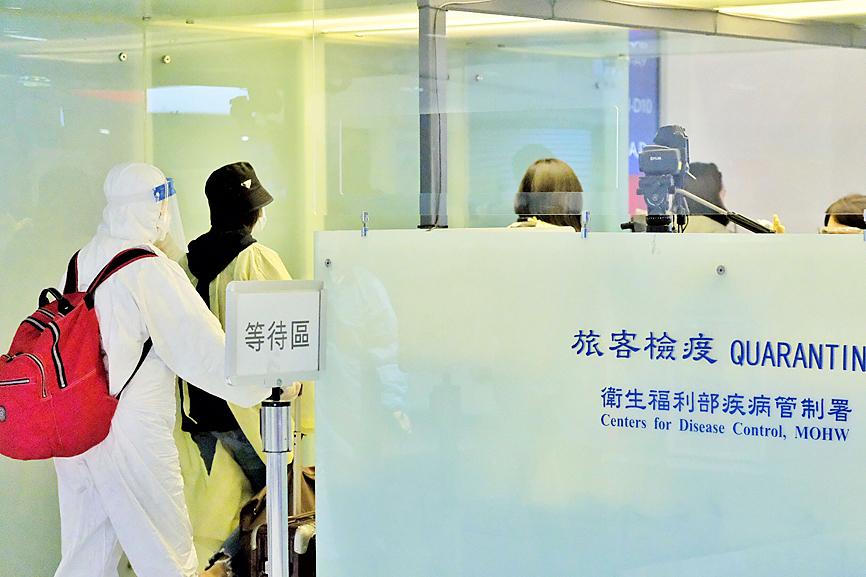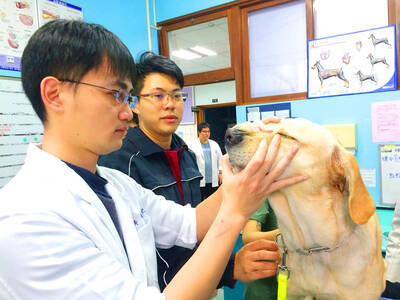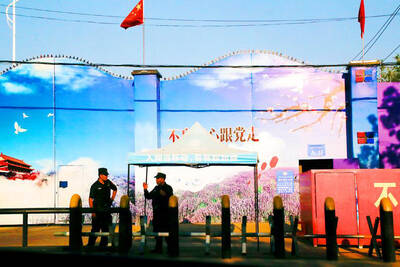Three passengers who on Sunday arrived on the first direct flight from the UK since stricter rules were imposed on travel from the country are among eight new imported COVID-19 cases the Central Epidemic Command Center (CECC) reported yesterday.
The new cases bring the nation’s total number of COVID-19 infections to 793, Minister of Health and Welfare Chen Shih-chung (陳時中), who heads the CECC, told a press conference.
All 114 passengers on the UK flight were tested for COVID-19 shortly after they arrived, Chen said, adding that of the three who tested positive, one is a Taiwanese teenager who had a fever upon arrival.

Photo: CNA
The teenager had a cycle threshold (CT) value of 15.7, indicating a relatively high viral load, Chen said.
The CECC considers a CT value of less than 35 an indicator of COVID-19.
Another Taiwanese teenager and a British man in his 30s also tested positive for COVID-19, but were asymptomatic with CT levels of 33.5 and 34.5 respectively, indicating that they had been infected for a long time, said Centers for Disease Control Deputy Director-General Chuang Jen-hsiang (莊人祥), the CECC’s spokesman.
The other passengers, who all tested negative for COVID-19, are in centralized quarantine, Hospital and Social Welfare Organizations Administration Commission Director Wang Pi-Sheng (王必勝) said.
Three of the other new imported cases also traveled recently from the UK, including a British man in his 20s who arrived in Taiwan on Dec. 20 and tested positive yesterday after he had swollen tonsils and an earache while in quarantine, Chen said.
He had contact with a family member in Taiwan, who has been instructed to quarantine for 14 days, Chen added.
A Taiwanese man in his 20s who traveled to the UK in February to study, developed a fever, sore throat, runny nose and muscle aches after returning on Tuesday last week, after which he tested positive for the disease, Chen said.
A British man in his 20s, who tested positive for COVID-19 on Aug. 29, but later tested negative for the disease four times from Dec. 9 to Monday last week, arrived in Taiwan on Wednesday last week, Chen said.
On Sunday, he was tested as part of a mass testing of people with a recent UK travel history, and the results came back positive, although he had no symptoms, Chen said.
As 15 people who sat near him on the plane to Taiwan were in transit to a third country, the CECC would notify them through the IHR National Focal Point, Chen said.
All arrivals from the UK, as well as travelers who had visited the country in the past two weeks, are required to quarantine in designated facilities and must be tested for COVID-19 at the end of the 14-day period, according to regulations the CECC began implementing on Wednesday last week.
All passengers from the UK are also being tested upon arrival.
Regarding whether any of the 1cases from the UK were infected with a new strain of COVID-19 reported in the country, Centers for Disease Control Director-General Chou Jih-haw (周志浩) said it would take at least three days to conduct a genome sequence analysis to make that determination.
The other two cases reported yesterday are migrant workers in their 20s, a woman from the Philippines and an Indonesian man, Chen said.
Although Taiwan has banned the entry of Indonesian migrant workers since Dec. 4, due to rising COVID-19 cases in the country and concerns over the credibility of test results issued there, exceptions have been made for those hired to work on Taiwanese ships.

Former Czech Republic-based Taiwanese researcher Cheng Yu-chin (鄭宇欽) has been sentenced to seven years in prison on espionage-related charges, China’s Ministry of State Security announced yesterday. China said Cheng was a spy for Taiwan who “masqueraded as a professor” and that he was previously an assistant to former Cabinet secretary-general Cho Jung-tai (卓榮泰). President-elect William Lai (賴清德) on Wednesday last week announced Cho would be his premier when Lai is inaugurated next month. Today is China’s “National Security Education Day.” The Chinese ministry yesterday released a video online showing arrests over the past 10 years of people alleged to be

THE HAWAII FACTOR: While a 1965 opinion said an attack on Hawaii would not trigger Article 5, the text of the treaty suggests the state is covered, the report says NATO could be drawn into a conflict in the Taiwan Strait if Chinese forces attacked the US mainland or Hawaii, a NATO Defense College report published on Monday says. The report, written by James Lee, an assistant research fellow at Academia Sinica’s Institute of European and American Studies, states that under certain conditions a Taiwan contingency could trigger Article 5 of NATO, under which an attack against any member of the alliance is considered an attack against all members, necessitating a response. Article 6 of the North Atlantic Treaty specifies that an armed attack in the territory of any member in Europe,

LIKE FAMILY: People now treat dogs and cats as family members. They receive the same medical treatments and tests as humans do, a veterinary association official said The number of pet dogs and cats in Taiwan has officially outnumbered the number of human newborns last year, data from the Ministry of Agriculture’s pet registration information system showed. As of last year, Taiwan had 94,544 registered pet dogs and 137,652 pet cats, the data showed. By contrast, 135,571 babies were born last year. Demand for medical care for pet animals has also risen. As of Feb. 29, there were 5,773 veterinarians in Taiwan, 3,993 of whom were for pet animals, statistics from the Animal and Plant Health Inspection Agency showed. In 2022, the nation had 3,077 pediatricians. As of last

XINJIANG: Officials are conducting a report into amending an existing law or to enact a special law to prohibit goods using forced labor Taiwan is mulling an amendment prohibiting the importation of goods using forced labor, similar to the Uyghur Forced Labor Prevention Act (UFLPA) passed by the US Congress in 2021 that imposed limits on goods produced using forced labor in China’s Xinjiang region. A government official who wished to remain anonymous said yesterday that as the US customs law explicitly prohibits the importation of goods made using forced labor, in 2021 it passed the specialized UFLPA to limit the importation of cotton and other goods from China’s Xinjiang Uyghur region. Taiwan does not have the legal basis to prohibit the importation of goods